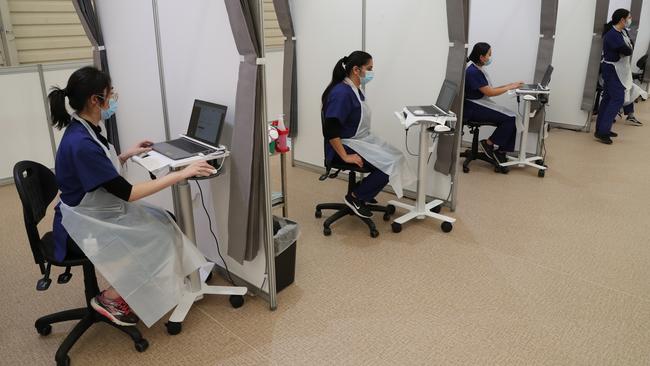Covid-19 vaccine: Feds could do with shot of leadership on border issue

Australians have not seen the same clarity of purpose and willingness to lead from the federal government in reopening our borders. Its approach has been surprisingly reactive, with an unusual deference to the states. The passivity of the federal government’s position is set out in its budget papers. Instead of a plan to reopen borders with targets and timelines, Australians were presented with assumptions and hopes about the rollout of a population-wide vaccination program and the possible reopening of borders from mid-2022.
The lack of federal leadership on reopening Australia reflects the political risks. The government is reluctant to assume responsibility prior to the next election for a tough decision involving significant risks to the community. It is also evidence of a realignment of power within the Federation. The pandemic has seen the states step up to lead, with the commonwealth often taking a back seat.
Prior to the pandemic, successive federal governments were all too willing to direct and even overturn state action, by intervening across a wide range of what were once considered state responsibilities, including health and education, in the name of asserting the “national interest”.
The federal government could have followed this path during the pandemic. It has the power at its disposal to direct a national approach to everything from controlling movement to lockdowns and social distancing. It can do so because the Constitution vests the commonwealth with a power over “quarantine” that can be used to override state laws. It also has extraordinary powers under the Biosecurity Act to respond to every aspect of the pandemic.
Instead, the commonwealth has adopted a collaborative approach through its new national cabinet. This provides space for every state to make its own decisions about how best to protect its community without federal intervention. The national interest has been displaced by a parochial set of state interests reflecting the risk appetite of each premier. The result is unpredictable state border closures and wildly different reactions to minor outbreaks such as between, for example, NSW and Western Australia.
The state-based approaches are often inconsistent but there is no doubting their effectiveness as compared with other nations. State governments have the most experience in delivering services and with the people and resources to support on-the-ground health interventions, contact tracing and lockdowns.
The deferential mindset of the commonwealth was acceptable when it came to state borders and local responses, but should not apply when it comes to national border control. This is quintessentially a federal responsibility. Our national border cannot be open in one state and not others. Australia needs a single, national response.
Instead of a national plan, the void has been filled with an endless media cycle of political bickering. It seems not a day goes past without one state disagreeing with another, or the commonwealth being at odds with a premier. This unresolved public debate is creating debilitating uncertainty and further eroding confidence in exposed sectors including aviation, higher education and tourism.
Even the most basic questions remain unanswered. Will our borders reopen when a certain percentage of the population is vaccinated? Or do we merely need to wait until every Australian has had a fair opportunity of being vaccinated? Are there other preconditions that need to be satisfied, such as a functioning system of vaccine passports?
The unresolved debate is also having a negative effect on Australia’s vaccination program. It is hard for many Australians to see why they should rush to have a vaccine when the risk of infection is low and there is no immediate prospect of our borders reopening. For many people, the rational approach is to wait to see if alternate vaccines become available and more is known about the side-effects. This is contributing to the nearly one-third of Australians who say they are unlikely to be vaccinated in coming months.
The federal government must overcome these problems with clear communication and leadership. A decision to reopen our borders at a specified time, subject to the preconditions of community safety being met, would focus the minds of many about the need to vaccinate. It would also inject urgency into our vaccination program and motivate people to ensure they are protected well before the risk of infection increases. This would also shift the national debate from pursuing an unrealistic elimination strategy to what the Prime Minister has described as learning to “live with the virus”.
George Williams is a Deputy Vice-Chancellor and Professor of Law at the University of New South Wales.



The federal government acted decisively to close our borders in response to Covid. It went further than other nations in not only restricting who can come to Australia, but in preventing Australians from leaving our shores. The message on the Smartraveller website is simple and direct: “Do not go overseas.”